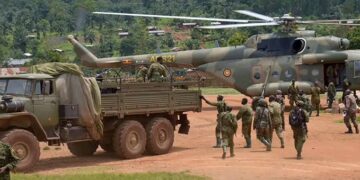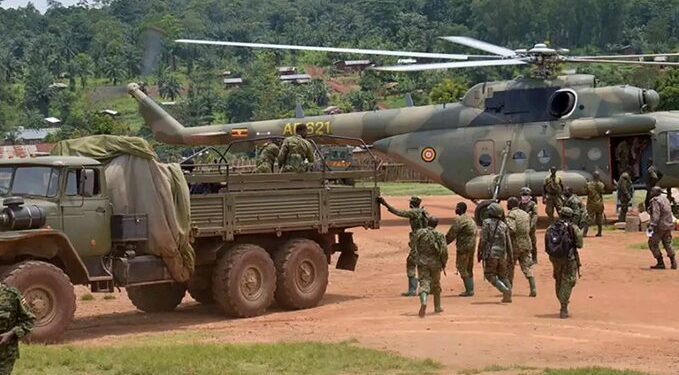The Uganda Peoples’ Defence Forces (UPDF) on Friday firmly dismissed allegations circulating on social media that it deployed chemical and barrel bombs during recent operations in South Sudan, labelling the claims as “false and misleading.”
The allegations, which suggest that Ugandan Air Force jets dropped chemical weapons on rebel White Army positions in the Upper Nile and Jonglei states, were attributed to propaganda linked to South Sudanese opposition leader Dr Riek Machar and his allies.
In a statement released Friday, Acting Defence Spokesperson Col Chris Magezi stated: “The UPDF neither possesses chemical weapons and barrel bombs nor operates systems designed to deliver them. Great care is always taken to avoid attacking civilians or civilian objects.”
Magezi further added that the reports were part of an AI-generated propaganda campaign and urged the public to “ignore the naysayers.” He insisted that UPDF operations are “guided by professionalism and precision,” and reaffirmed that Uganda’s presence in South Sudan is fully backed by that country’s government.
Parliament Approves Shs 39.1 Billion for UPDF Mission
Meanwhile, Parliament approved an additional Shs 39.1 billion in funding to support the UPDF’s peacekeeping mission in South Sudan. The deployment initiated nearly two weeks ago, aims to reinforce the government of President Salva Kiir amid escalating internal conflict.
Speaker Anita Among expedited the approval process, citing urgency and regional sensitivity. “I will not allow extensive debate on this matter… Diplomacy and security issues are highly sensitive,” Among said before a vote passed at 5:40 PM on Thursday.
Defence Minister Jacob Oboth Oboth told lawmakers that the deployment is legally grounded in Uganda’s Constitution, the UPDF Act, and a 2014 defence cooperation agreement with South Sudan. He warned that failure to intervene could have “severe repercussions for Uganda’s security and economy.”
Opposition Demands Transparency on Military Engagements
Despite the swift approval, the mission has sparked concern among lawmakers, particularly from the opposition, about transparency and oversight.
Kiira Municipality MP Ibrahim Ssemujju Nganda questioned why the public was learning about the mission through media reports and demanded an official government briefing. “Our Army is executing two wars—in DRC and South Sudan—and Parliament remains uninformed. Even more disturbing are reports that Uganda used chemical weapons,” he said.
Ssemujju also criticised the apparent contradiction in government messaging. Just weeks ago, Minister Oboth denied knowledge of any deployment, even as UPDF Chief Gen. Muhoozi Kainerugaba announced the arrival of commandos in Juba.
Support and Division in the House
The deployment has caused a rift among opposition MPs. Kilak South MP Gilbert Olanya supported the move, citing persistent security threats along Uganda’s northern border. “Anyone from northern Uganda would support this deployment. Our South Sudanese neighbours can be ruthless,” Olanya said.
Uganda’s military remains actively engaged across the region: in eastern DRC, the UPDF is involved in joint operations against Allied Democratic Forces (ADF) militants and Somalia, Uganda is a major contributor to the African Union peacekeeping mission. The South Sudan operation is the latest in a series of regional interventions.
Uganda previously deployed troops to South Sudan in 2013 and 2016, helping stave off a full-scale war between Kiir’s forces and those loyal to Riek Machar. The situation remains volatile, with thousands fleeing violence and seeking refuge in Uganda.








